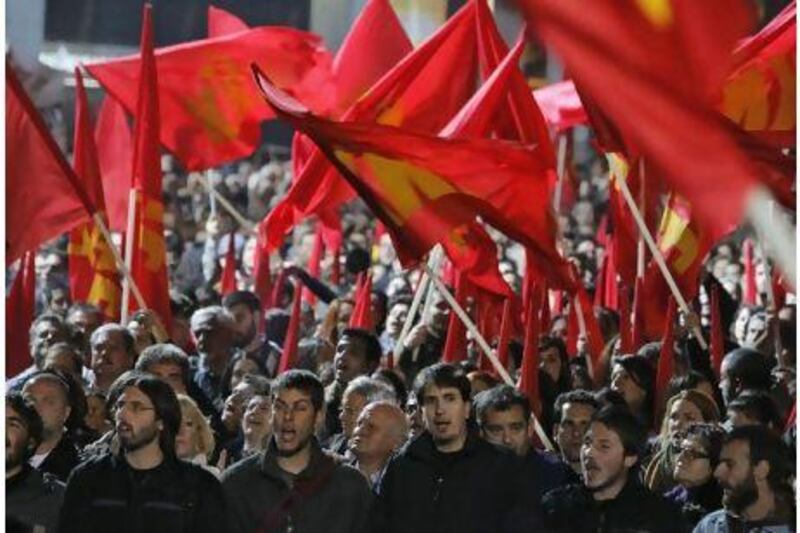Athens // World leaders yesterday failed to come up with a recipe to stem international financial instability as Greece, the immediate source of concern in the single currency euro zone, moved deeper into political uncertainty.
The political turmoil in Athens over the country's debt bailout package would continue, irrespective of the outcome of a vote late last night in parliament on the fate of the government of the prime minister, George Papandreou.
Protesters gathered outside parliament to shout their disapproval of austerity measures.
The political drama threw a shadow over the meeting of the G20 major economies in Cannes, France.
The leaders from both developed and emerging nations fell short on specific plans to shore up the teetering 17-nation euro zone or to spur growth.
The German chancellor, Angela Merkel, was blunt about the lack of direct support for the euro zone's bailout fund, the European Financial Stability Facility (EFSF), that is meant to support weak countries and banks.
"Hardly any countries in the G20" had shown a willingness to participate, she said at the summit.
The European Union had hoped to attract capital from countries such as China that possess considerable currency reserves.
Instead, the final communiqué mentioned an unspecified bolstering of the International Monetary Fund, which could aid the EFSF.
With Greece immersed in its own domestic affairs and its future as part of the euro zone in doubt, world leaders focused on the next weakest link, Italy, the third largest economy in the euro zone.
The country agreed to accept IMF and EU monitoring of its promised reform plan, with progress reports due every six months.
But the prime minister, Silvio Berlusconi, said Italy had turned down an offer of aid from the IMF, because it "was not necessary".
The efforts to insulate Italy from events in Greece gained more urgency as the political situation in Athens remained murky yesterday.
The socialist government of Mr Papandreou confirmed he had withdrawn his plan to hold a referendum on the bailout deal that he had agreed to in Brussels on October 26.
The unexpected referendum idea shocked his European partners, who thought they had taken a firm step towards restoring confidence in the euro zone. It infuriated domestic opponents and supporters alike. Mr Papandreou's majority of just two seats was cut even further as one rebel lawmaker from his Pasok party, Eva Kaili, said she would oppose the government in the confidence vote last night.
"The referendum was very dangerous. It could have led to a default so I did not support him on that," Mrs Kaili saidjust outside parliament in Athens.
She did not clarify her position now that the plan had been dropped.
But whatever the outcome of the vote, she said that Mr Papandreou's days as prime minister looked numbered and that he would have to negotiate with the opposition conservative New Democracy party.
"It will be very difficult for him to stay on. It will depend on the talks about a transitional government with New Democracy.
"But his base in parliament is not broad enough anymore," said Mrs Kaili.
As darkness fell in the Greek capital, demonstrations organised by labour unions hurled slogans at the parliament building where the debate on the rescue package was raging.
Polls showed that most Greeks oppose the austerity measures and other parts of the bailout deal, even though they are also said to support staying in the euro zone.
Athens has been the scene of intense rioting in earlier protests against austerity.
Mr Papandreou's referendum plan was seen as an attempt to gain popular backing for the measures.
Dimitris Kazakis, economist and commentator at Athens's Radio9, said the government would have lost the referendum.
"If you ask the people, in my opinion more than 60 per cent, 70 per cent would say take your euro and your agreement and leave the country."
Approval of the bailout deal by parliament now looked likely, after the conservatives said they could support it. But this still leaves Greece to cope with deep-seated anger among the population.
"By the end of the year, if they go ahead with this plan, we'll have a social revolution, like in the Arab spring," said Mr Kazakis.
But Mrs Kaili was more optimistic, even though the hardships for Greece would be considerable.
"Now that the main parties agreed on the deal of 26 October, there is broad support for it and the people will also support it."






